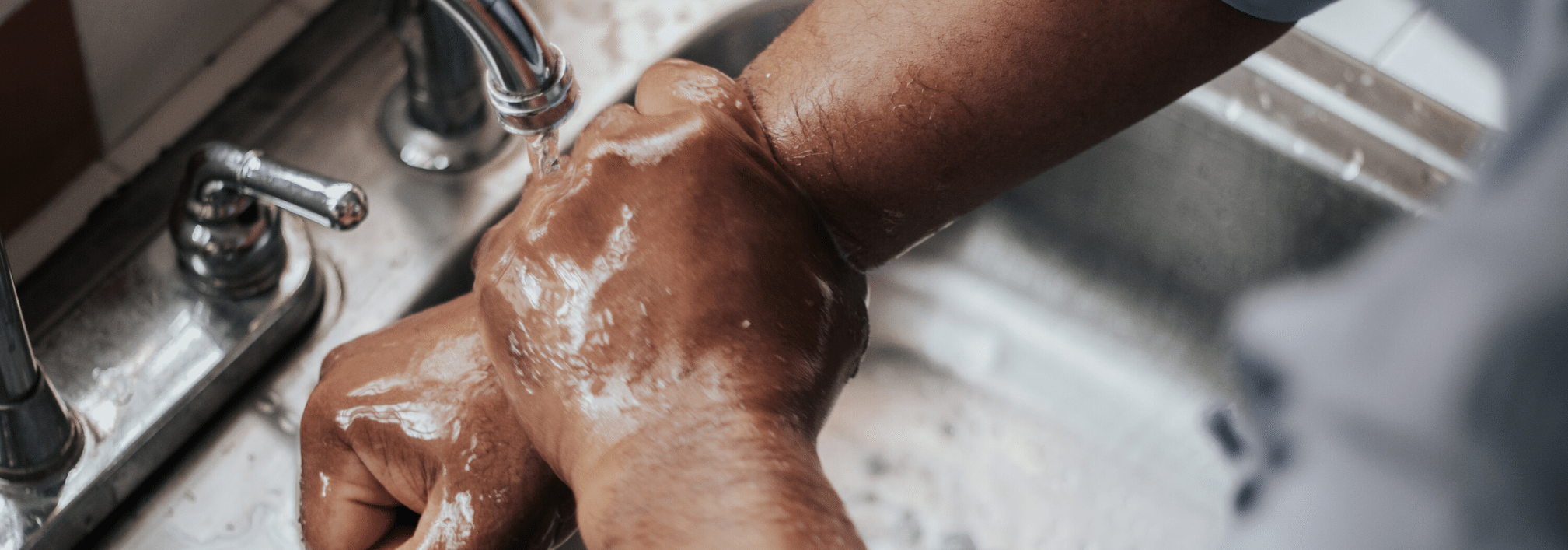Menu
Login
- SOLUTIONS
-
-
FRANCHISEES
-
FRANCHISORS
PARTNER VENDORS
-
-
-
- MARKETPLACE
- RESOURCES
- ABOUT
- SCHEDULE A DEMO
-

At this point, probably everyone in America is well aware of the COVID-19 strain of novel coronavirus, and you’ve probably already seen the impacts to the restaurant industry firsthand. As a restaurant operator, there are many important questions about coronavirus that you need to have answered. First and foremost, with all of the news flying around, what do you really need to know about the virus? Secondly, how will your sales will be impacted? What if you have to reduce your staffing? And most importantly, how can you make sure your restaurant sanitation procedures are enough to keep the virus at bay?
Let’s start by setting the record straight with some of the most frequently asked questions about COVID-19.
Coronaviruses are a large group of viruses with many different strains, much like influenza. And just like the flu, scientists will often refer to specific strains by the year they become novel (new). COVID-19 is the specific name for the 2019 strain of coronavirus. But you can just say “coronavirus”—people will know what you mean.
Alcohol-based hand sanitizers are great for quickly sterilizing your hands from bacteria, and is quicker than washing your hands. However, the COVID-19 virus is surrounded by a lipid shell—a shell that is broken down by soap, and which the virus cannot survive without. In fact, according to the CDC, soap and water are even more effective against the virus than hand sanitizer. In this time, most QSRs and restaurants are required to wash their hands with antibacterial soap, rinsed and dried, and then sanitizer applied. Can’t be too careful!
COVID-19 infects people through the respiratory system, not the digestive system; there isn’t any evidence that you can get sick from food. You can, however, become infected from breathing air from someone carrying the disease—especially if that person has been coughing or sneezing. This is why the CDC has emphasized physical distancing—staying at least 6 feet away from others, whenever possible.
Even though COVID-19 is not a foodborne illness, the restaurant industry will be impacted. As of the publishing of this article, California, Illinois, Massachusetts, New York, New Jersey, Ohio, Pennsylvania, Washington, and Minnesota have ordered dine-in restaurants to be closed state-wide. With no other options in these states, expect to-go and drive-thru sales to go up.
Let’s be honest: people are anxious. Social engagement of any kind is going to take a hit, and that includes going out to eat. Many people are stocking up on groceries to eliminate the need to leave the house altogether. With a sudden demand for staples like rice, beans, and toilet paper, some grocery stores have even set up special shopping periods exclusively for high-risk customers to shop without having to fight the crowds.
And reduced customer demand isn’t the only factor; supply chains are likely to be interrupted, too. With travel restrictions being implemented around the world, many believe that the impact to supply chains could be even greater than the 2002 SARS outbreak.
So we’re not going to sugar-coat it: while to-go and drive-thru sales are going to increase, overall sales are going to decline. Many small restaurants, like Minneapolis’s Modern Times cafe, have already resorted to crowdfunding to stay aloft. Expect a slump in sales, to say the least.
If you’ve had to cut your employees’ hours (or eliminate some of your staff altogether), you need to be aware of the changes your state has made to unemployment. In Minnesota, for example, Governor Walz announced an executive order that, among other things, allows employees who have had their hours significantly reduced or lost their jobs to file for unemployement immediately, instead of waiting for the end of their first nonpayable week.
Familiarize yourself with your state’s unemployment laws so you can answer your employees’ questions, and so you know what you’re responsible for during this challenging period.
Now that we’ve got all the doom and gloom out of the way, let’s talk about something optimistic: how to keep your customers safe and happy. It’s better to overreact than to underreact. “Wait and see how bad it gets” is for snowstorms, not for virus outbreaks. If you think you’re being too careful, you’re probably off to a good start.
At the time of this publishing, most dine-in options will be closed. However, if your dine-in area hasn’t been affected by a restaurant closure, start by doubling (or tripling) your cleaning routines. Do you wipe down the counters once each day? Make it once per shift. Do you have ordering kiosks? Wash them every 10 minutes. Better yet—wash them after each use. There are some things you won’t be able to do mid-day, like washing out the prep line, which brings us to the next item: hand washing.
Make sure your employees are washing their hands constantly. This cannot be stressed enough. As mentioned above, soap and water will literally kill the virus—not just prevent infection, but stop the spread in its tracks. It’s standard practice for food service employees to wash their hands when moving between tasks, but consider having them wash any time they have a few seconds between what they’re working on. Done prepping an order? Wash your hands. Handed the order to the customer? Wash your hands. Been a few minutes since you’ve washed your hands? Wash your hands. And when this is all over, buy each of your employees a nice bottle of hand lotion—because their hands should be thoroughly chapped from all that washing.
Beyond just washing hands, some QSRs, like Taco Bell, have mandated that even service personnel wear gloves typically worn by food production employees. Gloves are comfort for the employees and the guests, but not a replacement for washing/sanitizing hands frequently
The best advice for staying safe during a pandemic: pretend that everyone is carrying the disease (even if they aren’t showing symptoms), and pretend that everyone is at high-risk for complications.
For some of the people affected by COVID-19, quarantining is easy: stock up on mac ‘n’ cheese and binge Netflix at home. But for many of us, it’s not that simple. Not everyone has the luxury of walling up at home and riding this thing out. We have work to do, bills to pay, and people to feed.
As a restaurant operator, you are in a unique position to meet the needs of a vulnerable population while simultaneously stopping the spread of the disease that’s affecting them. Stay strong and take precautions, and your customers will thank you for your service. Also, stay tuned to your brand leaders for direction, advice, and more information in this ever-changing environment.

Delaget’s blog on operational strategies to grow your business faster.
Everything You Need to Know About Hiring & Retaining Teenagers During the 2021 Labor Crisis
Nickels and Dimes: 4 QSR Operational Money-Savers You Likely Haven’t Tried Yet
QSR Loss Prevention: 4 Ways to Prevent and React to Employee Theft